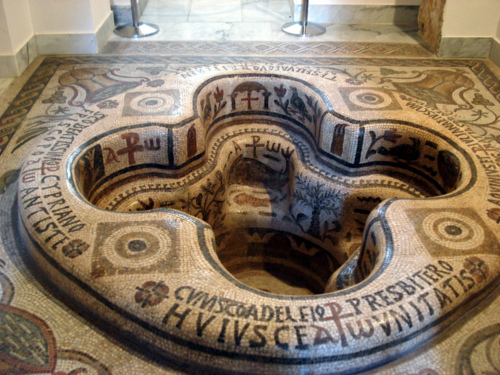The Mass of Easter Sunday
ACTS 10:34A, 37-43
1 COR 5:6B-8
JN 20:1-9
There’s something of a debate about how to best do moral theology: write short essays? Write monographs? Write long tomes – even several volume tomes- with great attention to detail?
But when it comes to the Paschal Mystery, to the highest holy days of the year, all of those are exposed as insufficient in the face of the great mystery: God made incarnate, God’s death on a cross for us, God rising  again. Peter tries mightily to proclaim this mystery in his homily from today’s reading in Acts:
again. Peter tries mightily to proclaim this mystery in his homily from today’s reading in Acts:
We are witnesses of all that he did
both in the country of the Jews and in Jerusalem.
They put him to death by hanging him on a tree.
This man God raised on the third day and granted that he be visible,
not to all the people, but to us,
the witnesses chosen by God in advance,
who ate and drank with him after he rose from the dead….
Yet the words cannot quite contain who this Christ is – when I read Peter’s homilies throughout Acts, I can’t help but keep thinking: “He’s saying it – what our faith means – and yet, he can’t ever quite let it rest.” His homilies are short and to the point – but Acts never lets the homily be the last word. Rather, Acts always states what the response of the people is. The words never quite encompass what Christ means – for Peter hopes not just for words but for a response: baptism, living together in community, sharing the bread and wine, giving to each other as we have need, practicing mercy.
We are called to respond to this great gift of God – and that response is our moral theology.
Yet we can hardly be blamed if our response is more like that of Mary Magdalene and the apostles who visit the empty tomb for the first time, as recounted in the gospel reading. Mary thinks the obvious: Jesus can’t be raised, someone must have taken his body – and runs off to find others who can help her find the body. Her response is not so far from our many of our own answers: we’re practical people, looking for the obvious answers, looking for the pragmatic solutions. We are very fond of saying, “That’s too idealistic. That’s not realistic. That’s not practical. That won’t really help all these x numbers of people.”
The disciple who arrives at the tomb first sees the evidence of the burial cloths but can’t even venture into the tomb to verify for himself. He remains outside looking in, not sure of how to respond. This, too, is very much like us: how many of us, when faced with racism or high rates of poverty or the depressing nature of hookup culture on campus, or the political fights that get heightened in an election year – find ourselves wondering, “What can I do?”
Peter actually walks into the tomb – but in this scripture, even he is not sure how to respond. They don’t yet remember, or know, about Jesus rising from the dead. We see Paul’s letter to the Corinthians, where he asks a particular response of us: to be new yeast – yeast of sincerity and truth, rather than the old yeast of malice.
Christ rising from the dead makes a difference in how we think and act and live.
Jesus told us that the Kingdom of God was like yeast mixed in with flour – something so small that we can barely see it once it is mixed in with flour – causes that flour to rise far beyond what we might have first imagined.
On this Easter, we are asked to imagine otherwise – we are asked to put aside pragmatism, realism, and despair and rise with Christ. We are asked to respond to Jesus by remembering that small and insignificant things (at least in the big picture) really do make a difference if we will allow ourselves to see and participate.
So this Easter, let us imagine what it might be like to respond in small ways that are sometimes deemed insignificant. My own small, starter list:
- To be charitable, even gracious, to the people who share different political convictions (who vote for Trump!)
- To make a stand for #BlackLivesMatter in some concrete speaking out
- To write a letter in support of the people of Flint, MI
- To pray for our enemies, especially suicide bombers
- To provide care for the unborn and their mothers by seeking after good maternal and prenatal care policies
- To not think the worst of theologians and other Christians with whom we disagree – to not dismiss them – to invite conversations.
What does your imagination envision as a yeasty response to this mystery of our faith?




